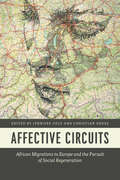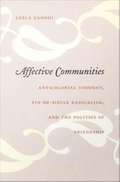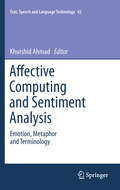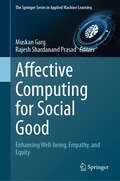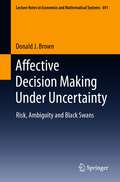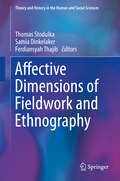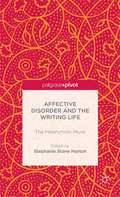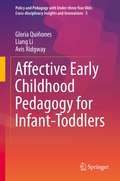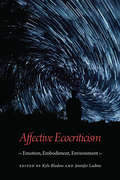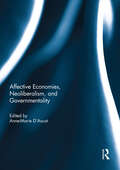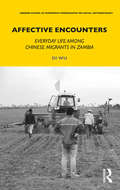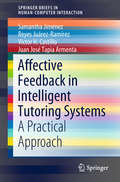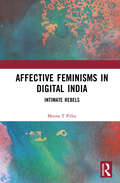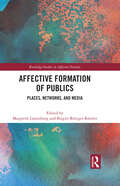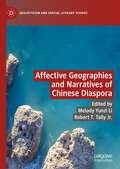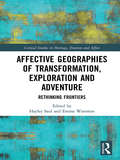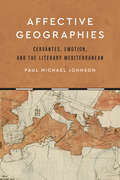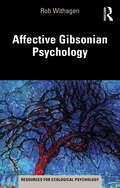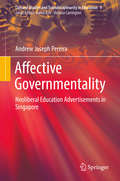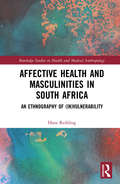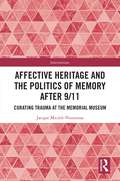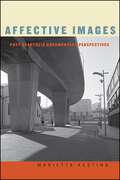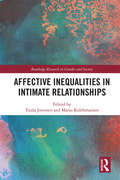- Table View
- List View
Affective Circuits: African Migrations to Europe and the Pursuit of Social Regeneration
by Jennifer Cole Christian GroesThe influx of African migrants into Europe in recent years has raised important issues about changing labor economies, new technologies of border control, and the effects of armed conflict. But attention to such broad questions often obscures a fundamental fact of migration: its effects on ordinary life. Affective Circuits brings together essays by an international group of well-known anthropologists to place the migrant family front and center. Moving between Africa and Europe, the book explores the many ways migrants sustain and rework family ties and intimate relationships at home and abroad. It demonstrates how their quotidian efforts--on such a mass scale--contribute to a broader process of social regeneration. The contributors point to the intersecting streams of goods, people, ideas, and money as they circulate between African migrants and their kin who remain back home. They also show the complex ways that emotions become entangled in these exchanges. Examining how these circuits operate in domains of social life ranging from child fosterage to binational marriages, from coming-of-age to healing and religious rituals, the book also registers the tremendous impact of state officials, laws, and policies on migrant experience. Together these essays paint an especially vivid portrait of new forms of kinship at a time of both intense mobility and ever-tightening borders.
Affective Communities in World Politics
by Emma HutchisonEmotions underpin how political communities are formed and function. Nowhere is this more pronounced than in times of trauma. The emotions associated with suffering caused by war, terrorism, natural disasters, famine and poverty can play a pivotal role in shaping communities and orientating their politics. This book investigates how 'affective communities' emerge after trauma. Drawing on several case studies and an unusually broad set of interdisciplinary sources, it examines the role played by representations, from media images to historical narratives and political speeches. Representations of traumatic events are crucial because they generate socially embedded emotional meanings which, in turn, enable direct victims and distant witnesses to share the injury, as well as the associated loss, in a manner that affirms a particular notion of collective identity. While ensuing political orders often re-establish old patterns, traumatic events can also generate new 'emotional cultures' that genuinely transform national and transnational communities.
Affective Communities: Anticolonial Thought, Fin-de-Siècle Radicalism, and the Politics of Friendship
by Leela Gandhi"If I had to choose between betraying my country and betraying my friend, I hope I should have the guts to betray my country. " So E. M. Forster famously observed in his Two Cheers for Democracy. Forster's epigrammatic manifesto, where the idea of the "friend" stands as a metaphor for dissident cross-cultural collaboration, holds the key, Leela Gandhi argues in Affective Communities, to the hitherto neglected history of western anti-imperialism. Focusing on individuals and groups who renounced the privileges of imperialism to elect affinity with victims of their own expansionist cultures, she uncovers the utopian-socialist critiques of empire that emerged in Europe, specifically in Britain, at the end of the nineteenth century. Gandhi reveals for the first time how those associated with marginalized lifestyles, subcultures, and traditions--including homosexuality, vegetarianism, animal rights, spiritualism, and aestheticism--united against imperialism and forged strong bonds with colonized subjects and cultures. Gandhi weaves together the stories of a number of South Asian and European friendships that flourished between 1878 and 1914, tracing the complex historical networks connecting figures like the English socialist and homosexual reformer Edward Carpenter and the young Indian barrister M. K. Gandhi, or the Jewish French mystic Mirra Alfassa and the Cambridge-educated Indian yogi and extremist Sri Aurobindo. In a global milieu where the battle lines of empire are reemerging in newer and more pernicious configurations, Affective Communities challenges homogeneous portrayals of "the West" and its role in relation to anticolonial struggles. Drawing on Derrida's theory of friendship, Gandhi puts forth a powerful new model of the political: one that finds in friendship a crucial resource for anti-imperialism and transnational collaboration.
Affective Computing and Sentiment Analysis: Emotion, Metaphor and Terminology (Text, Speech and Language Technology #45)
by Khurshid AhmadThis volume maps the watershed areas between two 'holy grails' of computer science: the identification and interpretation of affect - including sentiment and mood. The expression of sentiment and mood involves the use of metaphors, especially in emotive situations. Affect computing is rooted in hermeneutics, philosophy, political science and sociology, and is now a key area of research in computer science. The 24/7 news sites and blogs facilitate the expression and shaping of opinion locally and globally. Sentiment analysis, based on text and data mining, is being used in the looking at news and blogs for purposes as diverse as: brand management, film reviews, financial market analysis and prediction, homeland security. There are systems that learn how sentiments are articulated. This work draws on, and informs, research in fields as varied as artificial intelligence, especially reasoning and machine learning, corpus-based information extraction, linguistics, and psychology.
Affective Computing for Social Good: Enhancing Well-being, Empathy, and Equity (The Springer Series in Applied Machine Learning)
by Muskan Garg Rajesh Shardanand PrasadAffective Computing for Social Good: Enhancing Well-being, Empathy, and Equity offers an insightful journey into the intricate realm of affective computing. It covers a spectrum of topics ranging from foundational theories and technologies to ethical considerations and future possibilities. Beginning with "Deciphering the Emotional Spectrum: Advances in Emotion Science and Analysis," it sets the stage by tracing the evolution of understanding human emotions. Subsequent chapters explore practical applications, such as integrating clinical psychology with affective computing for therapeutic progress and leveraging affective computing in diagnosing and managing mood disorders more efficiently. As the narrative unfolds, the book emphasizes the crucial role of affective computing in fostering social justice and equity. It underscores the need for developing inclusive algorithms and databases while addressing ethical challenges like privacy, consent, and the risk of emotional manipulation. These discussions emphasize the significance of ethical deployment and regulation. The book also covers the technical aspects and applications of affective computing, including natural language processing for emotion recognition and analysis, voice emotion detection, and visual emotion recognition. It extends to applications, such as the use of affective computing in health management via recommender systems and personalized well-being interventions in mental health care. Addressing data challenges, "Enhancing Affective Computing with Data Augmentation: Strategies for Overcoming Limited Data Availability" presents solutions for imbalances affecting model performance. "Advancements in Multimodal Emotion Recognition" highlights the integration of facial expressions with physiological signals to improve emotion recognition accuracy and reliability. Concluding with "Ethical Considerations in Affective Computing" and "Cognitive Currents: A Path from Neuroscience to Consciousness," the book connects technical advancements in affective computing with broader ethical and philosophical inquiries surrounding consciousness and the human experience. Features: Helps readers understand the potential benefits of emotionally intelligent AI systems, such as improving mental health care, enhancing education, or promoting more ethical decision-making. Addresses ethical considerations related to the development and deployment of emotionally intelligent AI systems, helping readers to become more aware of the potential risks and trade-offs involved. Presents new approaches or frameworks for developing emotionally intelligent AI systems, providing readers with innovative ideas and perspectives. Provides examples of successful case studies where emotionally intelligent AI systems were used for social good, which may inspire readers to think about how they can contribute to society through AI development. Overall, this book will help readers gain a deeper understanding of the intersection between AI and human emotions, and how this technology can be used to create a more empathetic, compassionate, and socially responsible world.
Affective Decision Making Under Uncertainty: Risk, Ambiguity and Black Swans (Lecture Notes in Economics and Mathematical Systems #691)
by Donald J. BrownThis book is an exploration of the ubiquity of ambiguity in decision-making under uncertainty. It presents various essays on behavioral economics and behavioral finance that draw on the theory of Black Swans (Taleb 2010), which argues for a distinction between unprecedented events in our past and unpredictable events in our future. The defining property of Black Swan random events is that they are unpredictable, i.e., highly unlikely random events. In this text, Mandelbrot’s (1972) operational definition of risky random unpredictable events is extended to Black Swan assets – assets for which the cumulative probability distribution or conditional probability distribution of random future asset returns is a power distribution. Ambiguous assets are assets for which the uncertainties of future returns are not risks. Consequently, there are two disjoint classes of Black Swan assets: Risky Black Swan assets and Ambiguous Black Swan assets, a new class of ambiguous assets with unpredictable random future outcomes. The text is divided into two parts, the first of which focuses on affective moods, introduces affective utility functions and discusses the ambiguity of Black Swans. The second part, which shifts the spotlight to affective equilibrium in asset markets, features chapters on affective portfolio analysis and Walrasian and Gorman Polar Form Equilibrium Inequalities. In order to gain the most from the book, readers should have completed the standard introductory graduate courses on microeconomics, behavioral finance, and convex optimization. The book is intended for advanced undergraduates, graduate students and post docs specializing in economic theory, experimental economics, finance, mathematics, computer science or data analysis.
Affective Dimensions in Chemistry Education
by Murat Kahveci Marykay OrgillThis is a unique resource for those wishing to address the affective domain as they research and solve problems in chemistry education. Contributions by world-leading experts cover both fundamental considerations and practical case studies. This work fills a gap in the literature of chemistry education, which so far has focussed mainly on the cognitive domain. The affective domain refers to feelings-based constructs such as attitudes, values, beliefs, opinions, emotions, interests, motivation, and a degree of acceptance or rejection. It can affect students' interest in science topics and their motivation to persevere in learning science concepts.
Affective Dimensions of Fieldwork and Ethnography (Theory and History in the Human and Social Sciences)
by Thomas Stodulka Samia Dinkelaker Ferdiansyah ThajibThis book illustrates the role of researchers’ affects and emotions in understanding and making sense of the phenomena they study during ethnographic fieldwork. Whatever methods ethnographers apply during field research, however close they get to their informants and no matter how involved or detached they feel, fieldwork pushes them to constantly negotiate and reflect their subjectivities and positionalities in relation to the persons, communities, spaces and phenomena they study. The book highlights the idea that ethnographic fieldwork is based on the attempt of communication, mutual understanding, and perspective-taking on behalf of and together with those studied. With regard to the institutionally silenced, yet informally emphasized necessity of ethnographers’ emotional immersion into the local worlds they research (defined as “emic perspective,” “narrating through the eyes of the Other,” “seeing the world from the informants’ point of view,” etc.), this book pursues the disentanglement of affect-related disciplinary conventions by means of transparent, vivid and systematic case studies and their methodological discussion. The book provides nineteen case studies on the relationship between methodology, intersubjectivity, and emotion in qualitative and ethnographic research, and includes six section introductions to the pivotal issues of role conflict, reciprocity, intimacy and care, illness and dying, failing and attuning, and emotion regimes in fieldwork and ethnography. Affective Dimensions of Fieldwork and Ethnography is a must-have resource for post-graduate students and researchers across the disciplines of social and cultural anthropology, medical anthropology, psychological anthropology, cultural psychology, critical theory, cultural phenomenology, and cultural sociology.
Affective Disorder and the Writing Life: The Melancholic Muse
by Stephanie Stone HortonAffective Disorder and the Writing Life interrogates the mythos of the 'mad writer' through lived experience, literary analysis, writerly reflection and contemporary neuroscience. It explores how affective disorders colour, drive and sometimes silence the writing mind - and how affective difference has always informed the literary imagination.
Affective Early Childhood Pedagogy for Infant-Toddlers (Policy and Pedagogy with Under-three Year Olds: Cross-disciplinary Insights and Innovations #3)
by Avis Ridgway Gloria Quiñones Liang LiThis exciting new book brings fresh knowledge of affective pedagogies in early childhood education and care. The book draws on cultural-historical theory in alignment with visual methodologies to elucidate infant-toddlers’ affective pedagogies through analysis of case examples. The book reveals contemporary pedagogical practices in the infant-toddler space like mealtimes, nappy change and play. These pedagogical practices show the highly specialised nature of working with infant-toddlers such as the affective relations between educators and infant-toddlers, affective dialogue, affective engagement, and the creation of affective spaces. The value of collaboration is highlighted through creating an affective space for educators to become aware, reflect and position themselves as effective and affective educators. The book introduces innovative methodological tools such as images and collective drawings for collaborative reflection.
Affective Ecocriticism: Emotion, Embodiment, Environment
by Kyle Bladow Jennifer LadinoScholars of ecocriticism have long tried to articulate emotional relationships to environments. Only recently, however, have they begun to draw on the complex interdisciplinary body of research known as affect theory. Affective Ecocriticism takes as its premise that ecocritical scholarship has much to gain from the rich work on affect and emotion happening within social and cultural theory, geography, psychology, philosophy, queer theory, feminist theory, narratology, and neuroscience, among others. This vibrant and important volume imagines a more affective—and consequently more effective—ecocriticism, as well as a more environmentally attuned affect studies. These interdisciplinary essays model a range of approaches to emotion and affect in considering a variety of primary texts, including short story collections, films, poetry, curricular programs, and contentious geopolitical locales such as Canada’s Tar Sands. Several chapters deal skeptically with familiar environmentalist affects like love, hope, resilience, and optimism; others consider what are often understood as negative emotions, such as anxiety, disappointment, and homesickness—all with an eye toward reinvigorating or reconsidering their utility for the environmental humanities and environmentalism. Affective Ecocriticism offers an accessible approach to this theoretical intersection that will speak to readers across multiple disciplinary and geographic locations.
Affective Economies, Neoliberalism, and Governmentality
by Anne-Marie D’AoustAdvanced capitalism is characterized by a level of symbolic production that not only results in a dematerialization of labor, but also increasingly relies on highly emotional components, ranging from consumption desire to workforce management. Feelings as varied as love, anger, and desire are integral to neoliberal processes, though not in unproblematic and monolithic ways. Whereas some accounts decry capitalism’s hold on the emotional realm, as the commodified search for soul mates through online dating sites or Starbucks’ promotion of fair-trade coffee suggest, others counter that emotions represent a privileged site of resistance to market rationality. Relying on different case studies ranging from drone strikes, the 2008 economic crisis in Ireland, and marriage migration management, this volume builds on this productive tension between subjection and resistance through the lenses of the concept of governmentality. Developed by Michel Foucault, governmentality sheds light on the ways in which economic and political life are now being managed through logics of security and economic calculations. This volume explores how individuals might become emotionally attached to regimes of power that are detrimental to them, how neoliberal processes are concomitant with the valorization of certain emotional dispositions, and how affective economies might provide a site of resistance. This book was published as a special issue of Global Society.
Affective Encounters: Everyday Life among Chinese Migrants in Zambia (LSE Monographs on Social Anthropology)
by Di WuAgainst the background of China's rapidly growing, and sometimes highly controversial, activities in Africa, this book is among the first of its kind to systematically document Sino-African interactions at the everyday level. Based on sixteen months of ethnographic fieldwork at two contrasting sites in Lusaka, Zambia—a Chinese state-sponsored educational farm and a private Chinese family farm—Di Wu focuses on daily interactions among Chinese migrants and their Zambian hosts. Daily communicative events, e.g. banquets, market negotiations, work-place disputes, and various social encounters across a range of settings are used to trace the essential role that emotion/affect plays in forming and reproducing social relations and group identities among Chinese migrants. Wu suggests that affective encounters in everyday situations—as well as failed attempts to generate affect—should not be overlooked in order to fully appreciate Sino-African interactions. Deeply researched and with rich ethnographic detail, this book will be relevant to scholars of anthropology, international development, and others interested in Sino-African relations.
Affective Feedback in Intelligent Tutoring Systems: A Practical Approach (Human–Computer Interaction Series)
by Samantha Jiménez Reyes Juárez-Ramírez Victor H. Castillo Juan José Tapia ArmentaAffective components are as important as cognitive components in tutoring assisted learning process. Feedback from tutors is essential in keeping students motivated. Affectivity and motivation are also significant in computer-based tutoring systems. However, several educational frameworks do not include this kind of interaction between students and tutoring systems. In those cases, the students learning interest and motivation to learn could be negatively affected, and student profits from the system could be impoverished. This is why tutoring systems need to provide direct and affective interaction with students; it can encourage them and increase the motivation to learn. This book introduces a broad range of topics in affective learning in computer-based systems. The text offers a deep conceptual background, covering relevant concepts of affectivity, feedback and motivational components in learning environments. It describes the design of a proposed model for providing affective feedback, the mathematical validation of the conceptual model and its implementation. Moreover, it presents an analysis of the impact of the affective feedback on student motivation to learn. Finally, the book offers research perspectives of the impact and applicability of the affective feedback in computer-based tutoring environments. Affective Feedback in Intelligent Tutoring Systems can be used by human tutors who want to include motivational and affective elements in the learning process, researchers in Human-Computer Interaction and Education and by software developers who want to develop learning systems using these elements.
Affective Feminisms in Digital India: Intimate Rebels
by Meena T PillaiThis book studies digital feminist activism in contemporary India. It provides a close and comprehensive analysis of the postmillennial digital moment in India which has given rise to new modes of women’s digital dissent. The volume examines how anti-rape narratives, Feminichy scandals, #MeToo movements, and menstrual activisms, amongst a host of other performative feminist dissent and their discursive medialities create ‘affective digital feminisms’ which both break with and continue the residual and emergent practices within feminisms in India. It looks at digital womanspeak from India and focuses on vernacular forms of dissent, through which the author aims to decolonize feminist imaginaries from their moorings in the West. The author explores new digital, cultural, and social geographies where politically untamed women use their precarity to unsettle deep sexist structures and mount a gendered critique of the political economy of the nation state. An important contribution to the study of feminism in India, the volume will be useful for students and researchers of gender and women’s studies, cultural studies, digital sociology, intersectional feminism, transnational feminism, digital humanities, and South Asian studies. It will also be appeal to readers interested in the history of women’s dissent in India.
Affective Formation of Publics: Places, Networks, and Media (Routledge Studies in Affective Societies)
by Birgitt Röttger-Rössler Margreth LünenborgThis book offers an interdisciplinary analysis of current formations of publics that is informed by in-depth knowledge of affect and emotion theory. Using empirical case studies from contexts as diverse as India, Pakistan, Tanzania, and the Americas as well as Europe, the book challenges dichotomous distinctions between private and public. Instead, publics are understood as a relational structure that encompasses both people and their physical and mediatized environment. While each kind of public is affectively constituted, the intensity of its affective attunement varies considerably. The volume is aimed at academic readers interested in understanding the dynamic and fluid forms of contemporary formation of publics—be it digital or face-to-face encounters as well as in the intersection of both forms. This includes researchers from media and communication studies, social anthropology, theatre or literary studies. It is aimed at advanced students of these disciplines who are interested in the unfolding of contemporary publics.
Affective Geographies and Narratives of Chinese Diaspora (Geocriticism and Spatial Literary Studies)
by Robert T. Tally Jr. Melody Yunzi LiIn various ways, Chinese diasporic communities seek to connect and re-connect with their “homelands” in literature, film, and visual culture. The essays in Affective Geographies and Narratives of Chinese Diaspora examine how diasporic bodies and emotions interact with space and place, as well as how theories of affect change our thinking of diaspora. Questions of borders and border-crossing, not to mention the public and private spheres, in diaspora literature and film raise further questions about mapping and spatial representation and the affective and geographical significance of the push-and-pull movement in diasporic communities. The unique experience is represented differently by different authors across texts and media. In an age of globalization, in “the Chinese Century,” the spatial representation and cultural experiences of mobility, displacement, settlement, and hybridity become all the more urgent. The essays in this volume respond to this urgency, and they help to frame the study of Chinese diaspora and culture today.
Affective Geographies of Transformation, Exploration and Adventure: Rethinking Frontiers (Critical Studies in Heritage, Emotion and Affect)
by Emma Waterton Hayley SaulCombining critical reflections from scholars around the globe as well as experiential records from some of the world’s most tenacious explorers, this book interrogates the concept of the ‘frontier’ as a realm of transformation, exploration and adventure. We discover the affective power of social, physical, spiritual and political frontiers in shaping humanity’s abilities to change and become. We collectively unpack the enduring conceptualization of the frontier as a site of nation-state identity formation, violent colonization, masculine prowess and the triumph of progress. In its place, this book charts a more complex and subtle emotional geography amidst an array of frontiers: the expanding human psyche that is induced under free-diving narcosis and tales of survival on one of the most technically difficult mountains in the world, ‘The Ogre’. Chapters consider solitude in the Sahara, near-death experiences in Tibetan Buddhism, the aftermath of a volcanic eruption in Bali, the Spanish Imaginary, snatched moments of sexual curiosity, and many more. This book will be of upmost importance to researchers working on theories of affect, the Anthropocene, frontier theory and human geography. It will be vital supplementary reading for undergraduates and postgraduates on courses such as Heritage Studies, Human and Cultural Geography, Anthropology, Tourism Studies and History.
Affective Geographies: Cervantes, Emotion, and the Literary Mediterranean (Toronto Iberic)
by Paul Michael JohnsonFor Miguel de Cervantes, to narrate a Mediterranean experience is to necessarily speak of an emotional experience. Affective Geographies takes as its point of departure the premise that literature is as influential in constructing the Mediterranean as are its geographic, climatic, or economic features. As the writer with the most vast and varied Mediterranean experience of his era, Cervantes is exceptionally well-suited for the critical task of recovering the literary Mediterranean. Engaging with the interdisciplinary fields of Mediterranean studies, affect theory, and the history of emotion, Paul Michael Johnson reads Cervantes’s texts alongside the affective structures that inscribe the Mediterranean as a space of conflict, commerce, expansion, and empire. In particular, he argues that Cervantes’s writing, with its uncommon focus on the Moorish, Islamic, and North African experience, can serve to realign misconceptions about the Mediterranean we have inherited today. Affective Geographies proposes that, with a more than four-hundred-year history of impacting the hearts and minds of readers, Cervantes’s works constitute a literary longue durée, ramifying beyond fiction to alter the popular imaginary and long-term cultural landscape.
Affective Gibsonian Psychology (Resources for Ecological Psychology Series)
by Rob WithagenAffective Gibsonian Psychology presents the first comprehensive ecological approach to our affective engagement with the environment, drawing on James Gibson’s new foundation of psychology. This book develops a unique theoretical framework, beginning with Gibson’s ecological approach, but also drawing on phenomenology, developmental systems theory, and the pioneering ideas of the psychoanalyst Alice Miller. The advanced perspective allows us to understand our emotional engagement with the environment, and the individual differences therein, without returning to the Cartesian assumptions that have plagued psychology since the 17th century. This book is intended to contribute to the ecological movement in psychology and is of interest to scholars working in the fields of Gibsonian psychology, affective science, phenomenology, clinical psychology, and (radical) embodied cognitive science.
Affective Governmentality: Neoliberal Education Advertisements in Singapore (Cultural Studies and Transdisciplinarity in Education #9)
by Andrew Joseph PereiraThis book investigates the subjectivities in education arising from the triumphant mobilisation of care as portrayed in educational advertisements, and provides a novel theory of affective governmentality based on empirical research on affect, neoliberalism, and governmentality. It also takes the bold step of encouraging the re-imagination of the central and pressing question of school marketisation in Singapore, and problematises the seemingly innocuous portrayals of care in light of neoliberal governmentality seeking to perform cultural work on preferred identities and subjectivities. Using a judicious selection of media artefacts, the book scrutinises the creation of emotional technologies through an ethic of caring, harnessing vulnerabilities and triumphalism. As such it not only equips readers to understand the role of emotional technologies but also offers a critical and alternative view of hope and aspirations for transforming society.
Affective Health and Masculinities in South Africa: An Ethnography of (In)vulnerability (Routledge Studies in Health and Medical Anthropology)
by Hans ReihlingAffective Health and Masculinities in South Africa explores how different masculinities modulate substance use, interpersonal violence, suicidality, and AIDS as well as recovery cross-culturally. With a focus on three male protagonists living in very distinct urban areas of Cape Town, this comparative ethnography shows that men’s struggles to become invulnerable increase vulnerability. Through an analysis of masculinities as social assemblages, the study shows how affective health problems are tied to modern individualism rather than African ‘tradition’ that has become a cliché in Eurocentric gender studies. Affective health is conceptualized as a balancing act between autonomy and connectivity that after colonialism and apartheid has become compromised through the imperative of self-reliance. This book provides a rare perspective on young men’s vulnerability in everyday life that may affect the reader and spark discussion about how masculinities in relationships shape physical and psychological health. Moreover, it shows how men change in the face of distress in ways that may look different than global health and gender-transformative approaches envision. Thick descriptions of actual events over the life course make the study accessible to both graduate and undergraduate students in the social sciences. Contributing to current debates on mental health and masculinity, this volume will be of interest to scholars from various disciplines including anthropology, gender studies, African studies, psychology, and global health.
Affective Heritage and the Politics of Memory after 9/11: Curating Trauma at the Memorial Museum (Interventions)
by Jacque Micieli-VoutsinasThis book critically examines the institutional curation of traumatic memory at the 9/11 Memorial Museum and its evocative power as a cultural storyteller. Memorial Museums are evocative spaces. Drawing on aesthetic practices deeply rooted in representing the ‘unrepresentability’ of cultural trauma, most notably the Holocaust, Memorial Museums are powerful, popular mediums for establishing cultural values, asking the visitor to contemplate "Who am I?" in relation to the difficult histories on display. Using primary data, this book poses important questions about the emotionally-charged site: what ‘moral lessons’ are visitors imparted with at the 9/11 Memorial Museum? Who is the cultural institution’s primary audience—the imagined community it reconstructs this traumatic history and safeguards its memories for? What does the National September 11 Memorial & Museum ultimately teach visitors about history, ourselves, and others? This work will be of interest to students and scholars in the areas of Human Geography, American Studies, Museum Studies and Public History, Cultural and Heritage Studies, and Trauma and Memory Studies.
Affective Images: Post-apartheid Documentary Perspectives (SUNY Press Open Access)
by Marietta KestingAffective Images examines both canonical and lesser-known photographs and films that address the struggle against apartheid and the new struggles that came into being in post-apartheid times. Marietta Kesting argues for a way of embodied seeing and complements this with feminist and queer film studies, history of photography, media theory, and cultural studies. Featuring in-depth discussions of photographs, films, and other visual documents, Kesting then situates them in broader historical contexts, such as cultural history and the history of black subjectivity and revolves the images around the intersection of race and gender. In its interdisciplinary approach, this book explores the recurrence of affective images of the past in a different way, including flashbacks, trauma, "white noise," and the return of the repressed. It draws its materials from photographers, filmmakers, and artists such as Ernest Cole, Simphiwe Nkwali, Terry Kurgan, Thenjiwe Niki Nkosi, Adze Ugah, and the Center for Historical Reenactments.This book is freely available in an open access edition thanks to Knowledge Unlatched—an initiative that provides libraries and institutions with a centralized platform to support OA collections and from leading publishing houses and OA initiatives. Learn more at the Knowledge Unlatched website at: https://www.knowledgeunlatched.org/, and access the book online at the SUNY Open Access Repository at <a href="http://hdl.handle.net/20.500.12648/7134 ">http://hdl.handle.net/20.500.12648/7134 .
Affective Inequalities in Intimate Relationships (Routledge Research in Gender and Society)
by Tuula Juvonen Marjo KolehmainenRaising to the challenge of how to grasp such forms of inequalities that are mediated affectively, Affective Inequalities in Intimate Relationships focuses on subtle inequalities that are shaped in everyday affective encounters. It also seeks to bridge a gap between affect theory and empirical social research by providing ideas and inspiration of how to work with affect in research practice. Presenting cutting-edge empirical studies on affect and intimate relationships, the collection - introduces alternative and novel ways of conceptualizing the workings of affect in intimate relationships - provides tools for tackling the subtle ways in which affectivity connects with power relations in intimate relations - develops innovative methodologies that provide better access to affect as an embodied experience A fascinating contribution to the interdisciplinary field of affect studies, Affective Inequalities in Intimate Relationships will appeal to advanced undergraduates and postgraduates interested in fields such as gender studies, queer studies and cultural studies.
